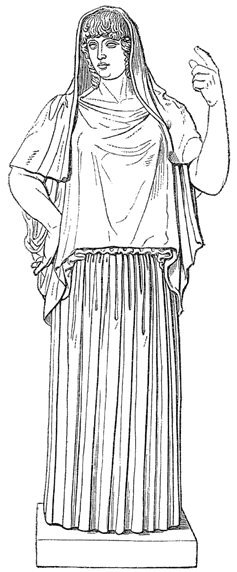Hestia
| Hestia | |
|---|---|
| Goddess of the hearth, home, domesticity, family, and the state | |

The Giustiniani Hestia in O. Seyffert, Dictionary of Classical Antiquities, 1894
|
|
| Abode | Delphi or Mount Olympus |
| Symbol | The hearth and its fire |
| Parents | Cronus and Rhea |
| Siblings | Demeter, Hera, Hades, Poseidon, Zeus, Chiron |
| Mount | Olympus |
| Roman equivalent | Vesta |
In Ancient Greek religion, Hestia (/ˈhɛstiə/; Ancient Greek: Ἑστία, "hearth" or "fireside") is a virgin goddess of the hearth, architecture, and the right ordering of domesticity, the family, the home, and the state. In Greek mythology, she is a daughter of Cronus and Rhea and the eldest of the Olympian Gods.
Hestia received the first offering at every sacrifice in the household. In the public domain, the hearth of the prytaneum functioned as her official sanctuary. With the establishment of a new colony, flame from Hestia's public hearth in the mother city would be carried to the new settlement. Her Roman equivalent is Vesta.
Hestia's name means "hearth, fireplace, altar", the oikos, the household, house, or family. "An early form of the temple is the hearth house; the early temples at Dreros and Prinias on Crete are of this type as indeed is the temple of Apollo at Delphi which always had its inner hestia" The Mycenaean great hall (megaron), like Homer's hall of Odysseus at Ithaca, had a central hearth. Likewise, the hearth of the later Greek prytaneum was the community and government's ritual and secular focus.
...
Wikipedia
